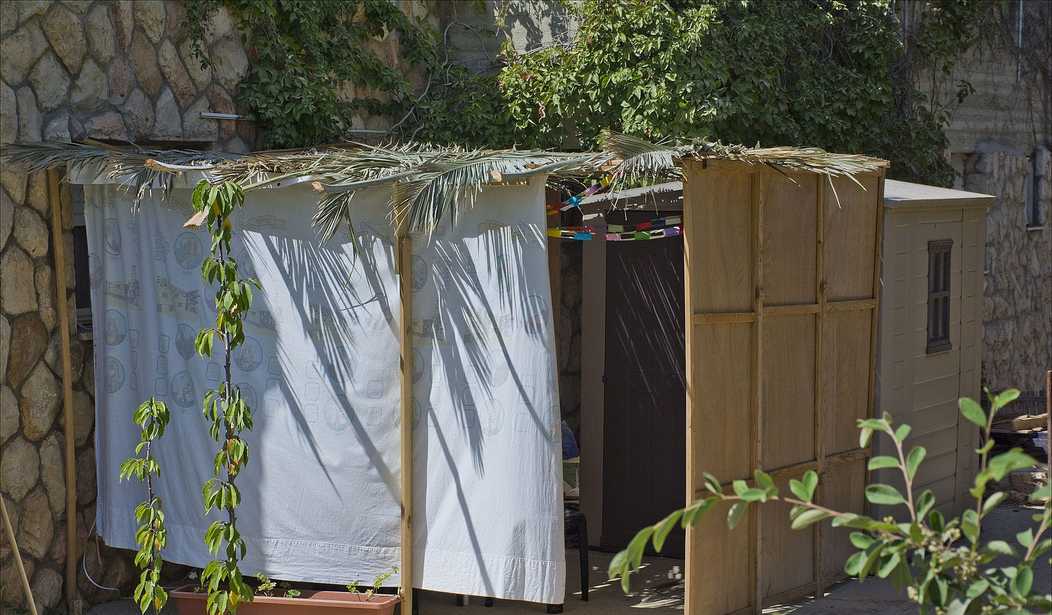The autumn holiday cycle in the Jewish calendar reaches its triumphant climax four days after Yom Kippur with the holiday of Sukkoth. It was long ago observed by the classical commentators that Sukkoth is, in a sense, displaced. The written Torah describes the holiday in this way: “But on the fifteenth day of the seventh month when you harvest the produce of the land you will celebrate a holiday for Ha-Shem, seven days; on the first day there will be a day of rest and on the seventh day a day of rest. And you will take for yourselves on the first day the fruit of a splendid tree, palm branches, a willow branch, and myrtle and you will rejoice bfore Ha-Shem your G-d seven days….In huts you will dwell for seven days; every citizen of Israel will dwell in huts. In order that your generations will know that I settled the bënei Yisra’él in huts when I brought them out of the land of Egypt….” (Leviticus XXIII,39-43).
The Exodus from Egypt occurred in the spring, and occasioned the holiday of Passover; even though this is intended as a reminder that G-d “settled [us] in huts” when He brought Israel out of Egypt, the holiday nonetheless occurs in the autumn, “when you are harvesting the produce of the land.” The usual explanation for this displacement is two-fold:
(1) There are more individual commandments connected with this holiday than with any other; having come out (we devoutly hope) with a slate wiped clean of sin in the wake of Yom Kippur, the Torah now affords us the possibility of accruing merit by performing many mitzvoth in rapid succession on this holiday.
(2) Were we to construct huts outside in the springtime, people observing us would simply think that we wanted shade from the sun; by doing so in the autumn, the time of year when the weather is most changeable, we are demonstrating that we are doing so in response to a Divine commandment, and not simply for our own enjoyment.
The most common contemporary name for the holiday, Sukkoth, simply means “huts,” and is of course derived from the custom of living, as much as possible, in such a hut outdoors, outside of our houses. The roof of the hut is constructed of plant material, which has to have grown from the ground but can no longer be connected to the ground, for which the term is sëchach (frm the same root as sukka). The general rule is that it should be thick enough to provide shade, but not so thick as to obscure the outside light entirely: In the word of the Mishna, tzillëthah mërubba méchamathah (“it’s shade is greater than its sunlight”).
The significance of dwelling in a sukka lies in that it is an expression of faith in G-d’s providence for us; during the most changeable time of the year, we come out of our carefully engineered and built homes with their weatherproof roofs, and come to dwell under the decidedly less protective (in any physical sense) covering of the sëchach as a demonstration of that faith and trust. For this reason, the Zohar terms the ëchach tzilla dimheimnutha, “the shade of faith.”
One of the most fascinating aspects of the holiday of Sukkoth is the fact that, alone of all the holidays specified in the Torah and hallowed by Jewish tradition, Sukkoth has some universal application. For one thing, when there is a Temple standing, a total of seventy sacrifices are offered during the course of the Sukkoth season, one on behalf of every one of the root nations of the Earth. But this isn’t the end of its universal application: as the prophet Zechariah foresaw, there will come a time when all the nations of the Earth will observe the holiday of Sukkoth (cf. Zechariah XIV,16-18, and ‘Aoda Zara 2b). To see why and how, the following is based on a talk give by the great visionary Rabbi Eliyahu Eli‘ezer Dessler in the yëshiva of Ponivezh (located in Bënei Bëraq, Israel) in 1953, shortly before his death; it can be found in the third volume of his collected discourses, the Michtav mé’Eliyahu.
The topic Rabbi Dessler was addressing was that of the ethical challenges facing the modern world, and he noted that western civilization, in particular, is permeated by a “can do” attitude, the idea that nothing is beyond the skills of modern engineering and science, leading to the sort of prideful arrogance which the Torah characterizes as kochi vë‘otzem yadi ‘asu li eth hachayil hazeh (“my power and the strength of my hand have made for me this prodigy;” Deuteronomy VIII,17). The west is in desperate need of taming this hubristic tendency, and finding a path to humility for itself; if not, Yishma‘él is waiting in the wings to do the job for the West, for Yishma‘él shares the shë’ifa qëdosha, the “sacred ambition” of his father Avraham to bring the entire world “under the wings of the Divine Presence,” as the Torah has it, but the danger lies in that Yishma‘él will do it in a wild, chaotic way. The blessing which he had received, let it be known, was that he would be a pere’ adam (Genesis XVI,12). This phrase is usually mistranslated, as anyone with a lively sense of the Hebrew language can attest: it means not “wild man” (since adjectives follow the nouns they modify in Hebrew) but rather “one who makes men wild.”
The prophets speak of a last, terrible war involving a coalition of nations against Israel led by a mysterious nation called Gog, whose ruler would appear to be named Magog (cf. e.g. Zechariah XIV, Ezekiel XXXVIII-XXXIX). The only clue which we have to their identity is that they are counted among the descendants of Yefeth, son of Noach (cf. Genesis X,2), who are generally considered to be the people of Europe (cf. e.g. Yoma 10a). We may therefore surmise that they have some relationship to western civilization.
The name Gog is itself interesting, since it appears to be derived from the same root as the Hebrew word for “roof,” gag. The idea of a gag is precisely what we are forsaking during this holiday for the sëchach of the sukka. As interesting is the title of the ruler of the nation of Gog, Magog, formed with the prefix of the active participle of the causative verbal conjugation: A Magog, then, is an enabler of Gag. Someone who embodies and encourages the “roof” principle, the idea of kochi vë‘otzem yadi, the ultimately egotistical, narcissistic antithesis of faith and trust in Ha-Shem, the wages of the arrogance of which Rabbi Dessler makes note.
The end of that final, horrible war will see the surviving remnants of the nation of the world come to observe Sukkoth; they will abandon their arrogance, and shelter under the tzilla dimheimnutha.
May it happen speedily, and in our times.









Join the conversation as a VIP Member